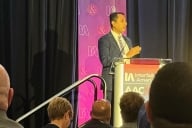You have /5 articles left.
Sign up for a free account or log in.
Taylor University last week cut ties with a professor accused of decades of sexual harassment. But outside the university, Dennis Hensley leveraged his status as a renowned Christian author and editor to seduce young, aspiring female writers, several victims and professional writing conference officials said.
In interviews this week with Inside Higher Ed, both survivors and witnesses allege a pattern: alone with women, Hensley would corner them and try to kiss and grope them -- behavior that was reported to conferences for years but rarely had consequences for him. Even when Hensley was occasionally uninvited from an event, conference leaders seldom shared their stories about him with one another.
Meanwhile, he kept his job as the architect of the evangelical Taylor’s illustrious professional writing program and largely escaped punishment until last Thursday, when Taylor announced that Hensley, 69, had resigned as a professional writing professor amid “significant and credible allegations of serious misconduct” the university had investigated. Taylor suspended Hensley, but he stepped down instead -- without prompting by the university, according to a statement from Taylor provided to Inside Higher Ed Tuesday.
Hensley did not respond to multiple requests for comment but previously denied all wrongdoing. He said in a previous interview that women misinterpreted his advances when he was only attempting to be comforting.
Initially, Taylor officials said they were informed about three incidents during Hensley’s 21-year tenure there, one in which he purportedly kissed a student in 2004 without her consent after she told him she had been raped. The other two episodes, the university said, did not involve sexual harassment or unwanted touching. All three times, Hensley was disciplined, but university officials declined to elaborate how.
One of the women who told Inside Higher Ed about inappropriate sexual behavior from Hensley said she reported it to Taylor when he started working there in the late 1990s, but the university could find no record of this.
Another woman charges that Hensley went further than inappropriate touching several decades ago at a conference: he slammed her up against a wall when his advances were unsuccessful, she said, then chased her down and attacked her in her car.
Interviews with figures in the Christian publishing world and some of his victims suggest that Hensley harassed and acted inappropriately toward women, with little consequence, for more than 30 years, and that participants warned the organizers of Christian writing conferences about his behavior on many occasions. Victims said sometimes, though, they never reported because they were ashamed or didn't want to stir up trouble on the Christian publishing circuit.
Hensley served as a marketing tool both for the university and for the conferences. He was a celebrated author, with more than 60 books published, as well as a trusted manuscript editor and mentor. Hensley would personally connect with and court high schoolers interested in the professional writing program he helped construct -- one 2017 Taylor alumna told a reporter that Hensley personally invited her and her family back to his Fort Wayne, Ind., home while she was visiting campus and wanted to drive back with her alone “to get to know her better.” She rejected the offer.
Many potential students were told that Hensley was the primary draw for pursuing the degree. He was extraordinarily well connected, often bringing prominent writers and publishers to address his students, with whom he would attend the writing conferences -- many times as the keynote speaker.
As an example: the Northwest Ohio Christian Writers group has listed Hensley as a central speaker for its annual seminar four times since 1995. In the online advertisement for its fall 2017 event, the organization boasted at the top of its website that Hensley would be speaking, putting his bio above the schedule and registration information.
“He is called a master of professional writing and thankfully his mission is to share his secrets with others!” the ad reads. The posting remained on the group's website as of Thursday. The group's president, Shelley Lee, said she and others were unaware of Hensley's behavior and had "nothing but professional interactions" with him. But another representative of the group, Betty Winslow, said Hensley would not be asked back.
Officials with two other conference organizations also said they didn't know about the allegations. Jill Esau, president of the Northwest Christian Writers Association, said she "would ask around" and that her conference had "enjoyed and appreciated" Hensley's teachings. After receiving an email inquiry from Inside Higher Ed, the director of the Kentucky Christian Writers Conference, Hallee Bridgeman, checked with committee members and faculty and said no one had heard reports about Hensley.
"At this time, we do not wish to comment other than to say we are saddened and deeply disturbed by these allegations and are following the news about them," Bridgeman wrote in an email. "If anyone affiliated with our conference brings such an incident to our attention at some point in the future, we will promptly and appropriately address the matter. Our committee is meeting in August, at which time we will be discussing this issue in conjunction with our processes for on-boarding faculty and keynote speakers in the future."
But at least one of Hensley's alleged victims said she told conference heads about Hensley’s actions over many years. Mary Lou Davidson Redding, the now retired editorial director of The Upper Room magazine, a Christian devotional, said in an interview that for more than a decade she made it her mission to warn conference directors about Hensley.
Davidson Redding encountered Hensley around the late 1980s to early 1990s at a conference. She said his behavior was entirely professional until one conversation at mealtime when it came out that she wasn’t married.
That night, while Davidson Redding was using the phones installed in the dormitories, where the conferees were staying, she said Hensley slipped up behind her and started rubbing her neck and shoulders. She shooed him away, as she was on the phone with her significant other.
He then tried to move his hands under her arms and place them on her breasts, Davidson Redding said. But someone else came into the room, and Hensley left, she said.
The next morning, after breakfast, Hensley followed Davidson Redding back to the dormitory and asked to go up to her room, she said. She refused and avoided him for the rest of the conference.
Davidson Redding said she would have dropped the matter had it not been for another talk with a friend. While she was telling her about the conference, the friend rolled her eyes and said, “Oh, is he still doing that?”
Davidson Redding was angry
"I was not going to keep my mouth shut," she said.
From then on, whenever she noticed that Hensley was attending a conference, she would contact the organizer and explain what had happened to her. She continued this for 10 years, but said his invitations were never rescinded based on her calls.
Davidson Redding said conference directors would either be distressed about having to pay a fee to cancel Hensley's appearance or simply did not want to -- the conferences typically operate on a shoestring budget, and Hensley’s presence attracted attendees, she said. Without money flowing in, the conference leaders risked their events being canceled.
She also said she once called Taylor’s communications department out of concern for vulnerable students after Hensley began working there. Davidson Redding said that Hensley often preyed on younger women, promising that he could help them professionally. Davidson Redding said she spoke to the head of the department but never heard back. The university said it had no record of the call.
“It just is what it is,” Davidson Redding said. “The conference directors want their conference to succeed, and Dennis helped the conferences to succeed. I just don’t know why had he been disciplined three times by Taylor and still had a job.”
Misconduct Revealed
In May, a conference director, who asked to remain anonymous, said she was talking with a male colleague and telling him about one of Hensley’s alleged assaults, about 10 years prior, in which an attendee (who was the director's friend) said Hensley forcefully attempted to kiss her and grab her breasts. The male colleague recounted a similar story he had heard and later asked the conference director if she was speaking about Hensley -- she had not named Hensley as the perpetrator in her story.
“I said, ‘Oh, I think we’ve got a problem,’” the conference director said in an interview, “because the two stories were so similar, and yet they took place 10 years apart with two different women.”
When word started circulating that the conference director was looking for information about Hensley, she said it "poured in."
She said she spent a day and a half printing emails from his alleged victims, with “eerily similar” stories of Hensley’s abuse. Some attached their names; others did not. She estimated that she was contacted by at least 20 victims. She worked with another conference director to provide the information to Taylor representatives.
She said officials at Taylor spent two and a half weeks investigating. In its statement, the university said it interviewed approximately a dozen individuals who provided information about Hensley’s conduct with “professional writers.”
One of those Taylor interviewed was Brenda Wilbee, who told Inside Higher Ed that Hensley sexually assaulted her more than 30 years ago. She said she wanted to come forward with her story because she was distressed that Hensley continues to "scapegoat" his victims in the press and that he maintains he did nothing wrong. But she commended Taylor officials, saying they've done "a remarkable job" of helping heal survivors' pain.
Wilbee, who was in her early 30s at the time of the incident, was working at a conference in Seattle and picked Hensley up from the airport. After Wilbee dropped him off at university housing where he was staying for the conference, Hensley asked her if she'd like to come in. Wilbee agreed, she said.
Immediately after they entered the room, Wilbee said she noticed a change in his demeanor -- from professional to a bit too casual as he flopped down on a sofa, while she sat in a chair near him, she said. Hensley bragged to Wilbee about how his name was on "all the magazine mastheads" and how he could make her a best-selling author. Hensley told Wilbee that his wife was sick and that they almost never had sex, she said. He took out a key ring and started swinging it on his finger. Hensley said "he could hand her the kingdom" if they rendezvoused at conferences, Wilbee recalled. She said she was appalled and told him no.
Wilbee said Hensley sprang from the couch, put his head in her lap and cradled her backside with his arm. She said she shimmied from the chair and tried to leave. She was part of the way out the door when he grabbed her, pushed her back into the room, slammed her against the wall and tried to kiss her. Wilbee eventually slipped away and ran back to her car, but Hensley pursued her, she said.
When she got into her car, he got in on the passenger side, grabbed her head and continued to try to kiss her, she said. Wilbee eventually blared her car horn and told him that she would drive away with the horn sounding if he didn't stop.
She remembered that he eventually stopped and stared at her and said, "Well, it's your fault for wearing that pretty white dress."
Wilbee said the Seattle conference director found out about what happened to her when Wilbee asked if someone else could drive Hensley back to the airport. The conference director drove Hensley herself and told him he would never return to that conference, Wilbee said. Hensley wrote her letters for a while, but eventually stopped, she said.
Pattern of Behavior
Many of the accounts of Hensley's alleged attacks contain similar elements, according to one author and a frequent attendee of Christian writers' conferences who requested anonymity. The author viewed written testimony from the victims: Hensley would lure women back to a private space and try to capitalize on his status as a prominent figure in the Christian publishing landscape to come on to them, then would be immediately sexually aggressive -- pin them down, kiss them forcefully and plead for intimacy, according to the author.
The author said Hensley would also use his wife's illness -- she was known to have been diagnosed, at different times, with both lupus and terminal cancer -- to either try to seduce his victims or as a defense to keep them from exposing him, the author said, adding that the anecdotes date to the 1980s and come from women in different states who attended the conferences.
These conferences are typically arenas for mostly younger writers to seek out and impress established authors, as well as editors and publishers. At the heart of the controversy with Pulitzer Prize-winning author Junot Díaz, too, was the power dynamic between him and the women who reported sexual harassment and bullying behavior -- younger women, attempting to network and find a professional break, and the venerable writer accused of abusing his status.
One conference, the Indiana Faith and Writing Conference, located at Anderson University, did bar Hensley in 2015, after one of his alleged assaults from around 2005 was reported to the conference director, Liz Ranfeld. She said in an interview that Hensley taught at the 2015 conference, but that after it wrapped up, her friend told her that Hensley had "behaved inappropriately" toward her 10 years before.
Ranfeld declined to provide more details about the friend's account, but said she told Hensley he would never be invited back. She said she had no idea at the time it fit a pattern -- no one reported any incidents to Ranfeld directly when Hensley attended the Indiana Faith conference, either in 2014 or 2015.
She said she spoke in late May with other conference directors who had heard rumors about Hensley's misconduct but were undecided about how to handle the situation -- they were working to get him banned from conferences, Ranfeld said, but never intended to go to his employer.
But Ranfeld said she did.
A 2005 alumna of Taylor, Ranfeld said she knew the chair of Hensley's department and met with her to pass on what she knew.
"I’ve been really discouraged to know that these stories were out there, and really frustrated," Ranfeld said. "And I don’t know that the current individual administrators at Taylor … knew these things, however, it’s clear that some people at Taylor knew these things. And for me, I find myself wanting to know what institutional changes there's going to be. I want to know if they have identified what the problem is … why this was able to go on for so long and what changes will they be making to ensure that those problems are fixed."
Rachel Custer, Hensley’s former advisee, who reported to Taylor administrators that he sexually assaulted her in 2004, posted online that an email address had been created (shareyourhensleystory@gmail.com) to compile stories about Hensley’s misconduct. Custer left Taylor after the encounter with Hensley she reported and never contacted administrators again after they told her “a letter” would be put in his file. She never sued the institution or Hensley.
A Taylor spokesman, Jim Garringer, said he was unaware of any current legal action against the university related to Hensley.
In an earlier interview with Inside Higher Ed, Hensley said he had no plans to write books anymore, but simply to care for his wife. One conference director said Hensley has been disinvited from all conferences and professional engagements. A former colleague of Hensley's, Jim Watkins, who also taught at Taylor, posted a statement on his website backing this assertion, writing that Hensley's academic, teaching and publishing careers are over.
Initially, Watkins wrote that some of Hensley's accusers wanted "the proposed punishment in The Merchant of Venice -- 'a pound of flesh'" and that women on Facebook and Twitter were out for blood. But he tempered his words in a newer version of the statement, simply referencing that "balancing justice and mercy" is delicate, and "perhaps something that only God can accomplish."
The executive director of the Midwest Writers Workshop, Jama Kehoe Bigger, said Hensley will never return as faculty or a committee member. In a statement, the workshop’s Board of Directors said Hensley taught at a summer workshop in 2016, but resigned after he was called out for requiring attendees to buy his book and for soliciting editing services during workshop sessions.
According to the statement, the board contacted other organizers and heard allegations, but none were reported at the Midwest Writers events. Board members said that given that the allegations date back decades and that Hensley spent “significant time” with students at the conference, they “aren’t ruling out the possibility” and asked attendees to report any incidents to them.
“We know other organizations and conferences are asking themselves the same tough questions,” the Midwest Writers statement reads. “We intend to be part of that conversation. We feel compassion for and support those brave persons who have come forward to tell their stories.”








